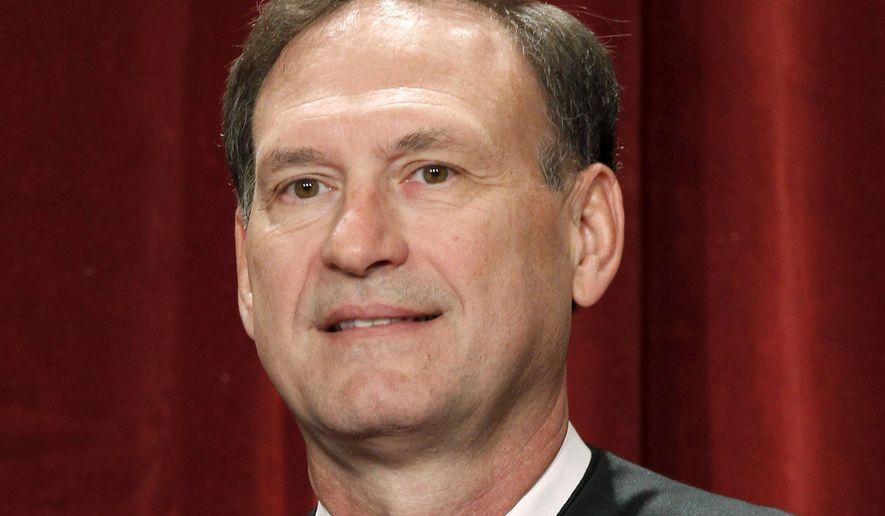The White House said Wednesday that President Obama “regrets” his filibuster as a senator in 2006 against Republican Supreme Court nominee Samuel Alito, as Democrats and liberal activists gear up to pressure Senate Republicans to allow a vote on Mr. Obama’s eventual nominee to replace the late Justice Antonin Scalia.
Mr. Obama’s vote a decade ago to block Justice Alito was “symbolic,” while current Republican opposition to Mr. Obama filling the vacancy is “reflexive” and unfair, said White House press secretary Josh Earnest.
“What Republicans are advocating is wrong and is inconsistent with the requirements of the Constitution,” he said.
Senate Majority Leader Mitch McConnell and several other Senate Republicans have said Mr. Obama should allow the next president in 2017 to fill the vacancy on the high court. The president said he has a duty under the Constitution to nominate a candidate soon.
White House allies in Congress and progressive groups said Wednesday they are mounting a grassroots lobbying campaign to pressure Mr. McConnell, Kentucky Republican, and other conservative lawmakers to back down and agree to hold a vote on the president’s eventual nominee.
“I am amazed at how much concern, upsetness, flummoxedness — how upset people are about this,” said Sen. Charles E. Schumer of New York, the No. 3 Democrat in the Senate. “Grassroots voices are going to be the key to getting Senator McConnell to back off.”
SEE ALSO: Democrats, liberal groups vow to fight for vote on Supreme Court nominee
Senate Democratic Leader Harry Reid of Nevada said of the Republicans, “They’re going to cave in.”
“The American people are going to make them pay if they jerk the president around on this,” Mr. Reid told reporters. “McConnell’s going to have to come around, he can’t keep this position. It would historically change our country.”
But in pushing for Senate Republicans to treat a nominee fairly, the White House is also facing questions about Mr. Obama’s party-line opposition as a freshman lawmaker to Jusice Alito’s nomination by Republican President George W. Bush. Then-Sen. Obama and 23 other Democrats, including Hillary Clinton, tried to filibuster the nominee.
Mr. Earnest said the president feels badly about the way he handled the Alito nomination as a senator.
“He regrets the vote that he made,” Mr. Earnest said. “Democrats should have been in a position where they were making a public case. And they shouldn’t have looked for a way just to throw sand in the gears of the process. Frankly, looking back on it, the president believes that he should have just followed his own advice and made a strong public case on the merits about his opposition to the nomination that President Bush had put forward.”
Hans von Spakovsky, a specialist on legal issues at the conservative Heritage Foundation, said Mr. Obama’s mea culpa and plea for fairness “doesn’t sound sincere to me at all.”
“Now that it’s his ox being gored, he suddenly regrets what he did,” said Mr. von Spakovsky, a former Bush appointee to the Federal Election Commission whose nomination in 2006 also was blocked by Mr. Obama and other Senate Democrats. “I have no doubt that if a Republican were to become president next year, he [Mr. Obama] would be publicly and behind the scenes working to make sure that Democrats filibustered anyone that he didn’t like for the Supreme Court.”
Asked if Mr. Obama was experiencing “karma” for his behavior 10 years ago, Mr. Earnest insisted there is a “stark difference” between Mr. Obama’s filibuster and the situation today. He said Senate Democrats in 2006 believed Justice Alito would be confirmed anyway.
Mr. Obama’s objections to Justice Alito “were based in substance,” Mr. Earnest said. “What the president regrets is that Senate Democrats didn’t focus more on making an effective public case about those substantive objections.”
The White House also said that Mr. Obama won’t attend Justice Scalia’s funeral Mass on Saturday in Washington. Instead, he and first lady Michelle Obama will pay their respects at the Supreme Court on Friday as the late justice lies in repose. Vice President Joseph R. Biden and wife Jill will attend the funeral.
Justice Scalia, 79, died in his sleep last weekend during a hunting trip in west Texas. He served nearly 30 years on the high court.
Replacing Justice Scalia, a leading conservative voice, could tip the balance of power on the Court. Sen. Ted Cruz, Texas Republican and a leading contender for the GOP presidential nomination, has vowed to block any Obama appointee.
But some Republican senators, such as Judiciary Committee Chairman Chuck Grassley of Iowa, are leaving the door open to holding a confirmation hearing and even a floor vote on a nominee.
Sen. John Cornyn, Texas Republican and a member of the Judiciary Committee, said Wednesday that the nomination should be left up to the next president. He said the confirmation will be “perhaps the most consequential thing that the Senate … has done in a long time.”
“This ought to be a referendum, this election for president, on who makes that appointment,” Mr. Cornyn said in a radio interview. “I think many people simply feel like they don’t recognize their country anymore. A lot of that has to do with cultural issues and the disregard for the rule of law. So I think it’s really important to have that referendum and leave that to the next president.”
But liberal activists from groups such as the Progressive Change Campaign Committee, MoveOn and Color of Change said they will be working with Democrats to inundate GOP lawmakers with emails, letters, phone calls and social media contacts to allow a hearing and vote on a nominee.
“We’re making clear that the public is paying attention,” said PCCC co-founder Adam Green.
• Dave Boyer can be reached at dboyer@washingtontimes.com.




Please read our comment policy before commenting.